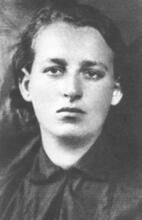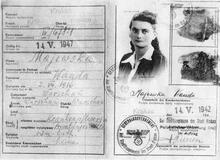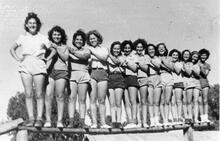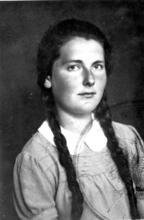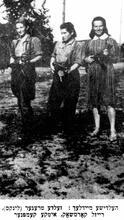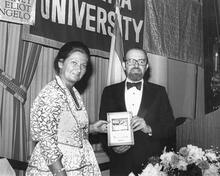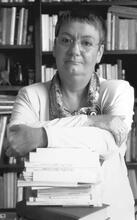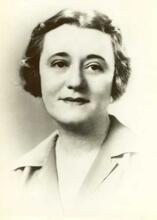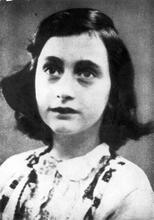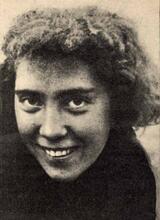Hantze Plotniczki
Hantze Plotniczki, born in 1918 to a Hasidic family in Plotnica, was introduced to Freiheit, a Labor Zionist movement, at age fourteen by her older brother, Eliyahu. She studied and trained diligently before becoming actively involved in the movement’s resistance missions during World War II. Her main roles within the movement were in educational activities and training new members. She inspired others with conversations of kibbutz life and the future of Zionism. Plotniczki was sent on missions to record the history of the movement during the war years. She was gifted with linguistic ability, literary gifts, learning, and the ability to connect with people. She stroved to inspire love among her peers and always sought after a high level of fulfillment.
Early Life
Hantze Plotniczki was born on the seventh day of A seven-day festival to commemorate the Exodus from Egypt (eight days outside Israel) beginning on the 15th day of the Hebrew month of Nissan. Also called the "Festival of Mazzot"; the "Festival of Spring"; Pesah.Passover, April 14, 1918, into a devoutly A member of the hasidic movement, founded in the first half of the 18th century by Israel ben Eliezer Ba'al Shem Tov.Hasidic family in Plotnica (Plotnitsa, near Pinsk). Like her older sister Frumka Plotniczki, she did not attend school because of the family’s financial difficulties and instead studied with their older sister Zlatka.
Plotniczki was a happy child, high-spirited, and filled with the joy of life: she would sing, laugh, skip along the rooftops, and climb trees at the head of a large and joyful band of youngsters.
Little Hantze was especially pampered, even by her father, a pious hasid burdened by financial woes. At the stormy debates around the family Sabbath table—between her brother Eliyahu, a member of the Labor Zionist movement, Freiheit; her sister Zlatka, a Communist; and her father, a fervent hasid—Plotniczki would often throw out some witty, incisive remark that made everyone laugh, thereby diffusing the tension.
Introduction to Activism
When Plotniczki was fourteen, her brother Eliyahu brought her into the Freiheit movement on the eve of his immigration to Palestine in 1932. Although Plotniczki was well-versed in Polish literature and culture and spoke only a broken Yiddish peppered with Polish phrases, she nonetheless found a way to connect with the members and integrate into the movement.
Plotniczki studied Hebrew diligently and astounded people with her keen ability to plumb the depths of the topic at hand. She was a fascinating combination of childishness, laughter, gaiety, song, and dance, coupled with intellectual ability and great depth of thought and expression.
In 1936 Plotniczki participated in the hakhsharah training program at Baranovichi. As part of her movement activities she would visit chapters, offer help and support, and organize and encourage members, learning from them as she went.
Plotniczki, who was involved in the process leading up to the unification of Freiheit and He-Haluz ha-Za’ir, took part in the joint nationwide seminar held in Falencia near Warsaw in 1938.
Missions during World War II
In November 1939, during the first weeks of World War II, Plotniczki was sent as a special emissary from Łódź to Lvov, which had become the temporary headquarters of the Dror and He-Haluz movements. She breathed new life into the group of young Zionists that had assembled there. After visiting her parents in Pinsk, Plotniczki returned to Lvov and from there made her way via Bialystok to German-occupied Warsaw. Every leg of her journey entailed great risks.
In Warsaw Plotniczki was active in the movement’s educational activities and in the training farm at Grochow. In July 1942, during the major Aktion in Warsaw, Plotniczki was sent by the movement to Bedzin. After many perilous incidents along the way, she reached Bedzin disguised as a non-Jew and recounted the difficult situation facing their comrades in Warsaw: the hunger, the suffering, and the struggle to continue movement activities uninterrupted. She consoled her fellow members and encouraged them to keep the A voluntary collective community, mainly agricultural, in which there is no private wealth and which is responsible for all the needs of its members and their families.kibbutz running.
Her arrival roused the other members from their state of gloom. Even during the hardest times at Bedzin, her spirit never waned. She made it a point not to overlook cultural activities and after an exhausting workday would gather the local members and talk to them about The Land of IsraelErez Israel and kibbutz life. Although the suffering around her did not leave her untouched, she managed to keep her spirits up. Constantly insisting that the members prepare to defend themselves in battle, she was among the first to gear herself for the fight ahead.
In the meantime, the situation deteriorated. Plotniczki became ill and spent several days with high fever, tortured by nightmares of the misery and horrors she had witnessed in Warsaw and en route to Bedzin.
In March 1943 Plotniczki was called to Warsaw, where a decision had been made to try to smuggle her out of Europe so that she might record the history of the movement during the war years. Under pressure from her sister Frumka she finally consented and departed for Warsaw, passing herself off as Aryan. Although Plotniczki did reach Warsaw, matters suddenly took a different turn; with the outbreak of the uprising in Warsaw, the leadership of the movement decided that she should return to Bedzin to help organize the self-defense there. During a break in the fighting, early in the morning of April 20, the first day of Passover, Plotniczki slipped through the alleyways of Warsaw together with three comrades, heading towards the railway station. When they reached the edge of the ghetto, they were arrested by a German patrol. The young men drew their pistols and shot the enemy to enable Plotniczki to escape. One of the comrades was wounded, two managed to escape, and Plotniczki, who also tried to flee, was captured and killed.
Hantze and Frumka
Both Plotniczki sisters, Hantze and Frumka, were weaned on identical values of straightforwardness and the constant pursuit of individual perfection that marked the Karliner hasidim, but each of them internalized these influences in her own way.
Hantze, the younger of the two, was blessed with many talents. Everything came to her easily and in abundance: linguistic ability, literary gifts, learning, a pleasing voice, eloquence, and the ability to connect with people. More than once, she expressed the wish to earn things the hard way, which she saw as a higher level of fulfillment.
Frumka was different: every achievement required tremendous emotional and physical struggles. She was quiet and introverted, serious, almost somber, and found it difficult to forge ties with people. By constantly engaging in activity, first in the family home and later in the movement, she found a way to channel her turbulent, troubled emotions.
The fact that the sisters were referred to jointly as “Hantze and Frumka,” with the younger one placed first, is no coincidence. Hantze occupied center stage, standing out from the moment she set foot in the movement’s meeting house, whereas Frumka found her place more slowly. It was only after years of hard work within the movement that her moral strength and ability to do the right thing were revealed at the moment of crisis.
In the words of her brother Eliyahu, Hantze was a passionate personality who knew how to absorb all the good that surrounded her and to distance herself from the bad, in the sense of the biblical verse: “… therefore choose life.” The magic of her face, her smile, the swing of her braids, were all heartwarming. There was something in the way she faced the world—a clear-eyed openheartedness, a willingness to give and to take—that inspired love for one’s fellow beings.
Hantze and Frumka. Tel Aviv: 1945.
Lubetkin, Zivia. In the Days of Destruction and Revolt. Kibbutz Lohamei ha-Getta’ot/Tel Aviv: 1973. Translated by Ishai Tubin. Tel Aviv: 1981.
Neustadt, Melekh. The Destruction and Resistance of the Jews of Warsaw. Tel Aviv: 1947.
Perelis, Rivkah. “Pioneer Youth Movements in Occupied Poland.” PhD diss., Kibbutz Lohamei ha-Getta’ot, 1987.
Zuckerman, Yitzhak. Those Seven Years: 1939–1946. Tel Aviv: Kibbutz Lohamei ha-Getta’ot, 1990.


